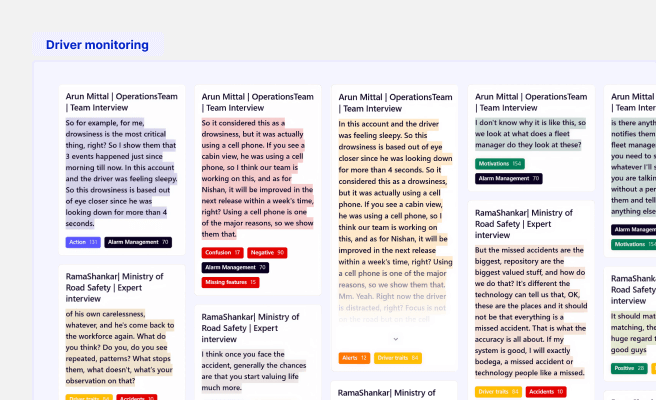Product Iteration
<p>Product iteration is a process of continuously improving a product through regular updates and refinements. This method is integral to the success of both startup and established companies, allowing them to adapt to user feedback and evolving market demands. Iteration in product design ensures that a product remains relevant, functional, and competitive.</p>
<p>The process of product iteration dates back to the early days of software development, where the agile methodology emphasized iterative progress. Today, this approach is widely adopted across various industries, including climate tech, where rapid innovation is essential for addressing environmental challenges effectively.</p>
<h2>Importance of Product Iteration</h2>
<p>Product iteration is crucial for several reasons:</p>
<ul>
<li><strong>Adaptability:</strong> It allows companies to adapt quickly to user needs and market changes.</li>
<li><strong>Quality Improvement:</strong> Regular updates help in refining features and fixing bugs, leading to higher quality products.</li>
<li><strong>User Satisfaction:</strong> By incorporating user feedback, companies can enhance user experience and satisfaction.</li>
<li><strong>Competitive Edge:</strong> Iteration helps businesses stay ahead of competitors by continually offering better products.</li>
</ul>
<h3>Components of Product Iteration</h3>
<p>Effective product iteration involves several key components:</p>
<ul>
<li><strong>User Feedback:</strong> Gathering insights from users through surveys, interviews, and usage data.</li>
<li><strong>Prototyping:</strong> Creating preliminary models of new features or changes for testing purposes.</li>
<li><strong>Testing:</strong> Conducting usability tests to evaluate new features and identify issues.</li>
<li><strong>Analysis:</strong> Analyzing test results and user feedback to determine necessary improvements.</li>
<li><strong>Implementation:</strong> Developing and deploying the improved product version.</li>
</ul>
<h2>Examples of Product Iteration</h2>
<p>Product iteration is widely used across various industries. For instance, in the <a href="https://www.frogdesign.com" style="color: #2896FF; text-decoration: underline;">climate tech sector</a>, companies like Frog Design continually iterate their digital products to better serve the environmental needs of their users. For example, a carbon capture startup might iterate its software to improve data accuracy and user interface based on user feedback.</p>
<p>Another example can be seen in software development, where companies like <a href="https://www.ideo.com" style="color: #2896FF; text-decoration: underline;">IDEO</a> employ product iterations to refine their applications and enhance user experience continuously.</p>
<h3>Challenges in Product Iteration</h3>
<p>While product iteration offers numerous benefits, it also presents certain challenges:</p>
<ul>
<li><strong>Resource Allocation:</strong> Regular updates require dedicated resources, including time, money, and personnel.</li>
<li><strong>Maintaining Consistency:</strong> Ensuring that each iteration aligns with the overall product vision and brand can be difficult.</li>
<li><strong>User Fatigue:</strong> Frequent changes may overwhelm users, especially if updates are not communicated effectively.</li>
</ul>
<h2>Strategies for Effective Product Iteration</h2>
<p>To overcome these challenges and ensure effective product iteration, companies can adopt the following strategies:</p>
<ul>
<li><strong>Clear Roadmap:</strong> Develop a clear product roadmap that outlines the goals and timelines for each iteration.</li>
<li><strong>Prioritize Feedback:</strong> Focus on high-impact feedback and prioritize changes that will most benefit users.</li>
<li><strong>Communicate Updates:</strong> Keep users informed about updates and changes to manage their expectations and reduce fatigue.</li>
<li><strong>Collaborate:</strong> Involve cross-functional teams in the iteration process to ensure comprehensive improvements.</li>
</ul>
<h3>Conclusion</h3>
<p>Product iteration is an essential process for companies aiming to remain competitive and user-focused. By continuously refining products based on user feedback and market trends, businesses can enhance their offerings and achieve long-term success. For those in the climate tech sector, iterative design not only drives business growth but also contributes to environmental sustainability and innovation.</p>
<p>To learn more about improving your product iteration strategies, consider conducting comprehensive <a href="https://www.uxfortech.com/audits" style="color: #2896FF; text-decoration: underline;">UX audits for tech</a> and engaging with specialized design firms experienced in iterative methodologies.</p> <p>If you’re looking for inspiration to elevate customer and user experience for enterprise-grade products, View our work with the Ministry of Health of Saudi Arabia for curating the UX of an <a href="https://www.whatifdesign.co/work/enterprise-software-for-hospitals" style="color:#2896FF; text-decoration:underline;">Asset Management Tracking Platform</a></p>
<p>Ready to get started? <a href="https://cal.com/akhilak/what-if-design?duration=30" style="color:#2896FF; text-decoration:underline;">Book a 1:1 consultation call</a> with us today.</p>

Let's scale your impact with great design.
Free consultation, no sales pitch
Thank you! Your submission has been received!
Oops! Something went wrong while submitting the form.
Let’s talk
Nothing great is built alone.
Let’s connect about your vision, our work and how we can collaborate.
Get in touch

